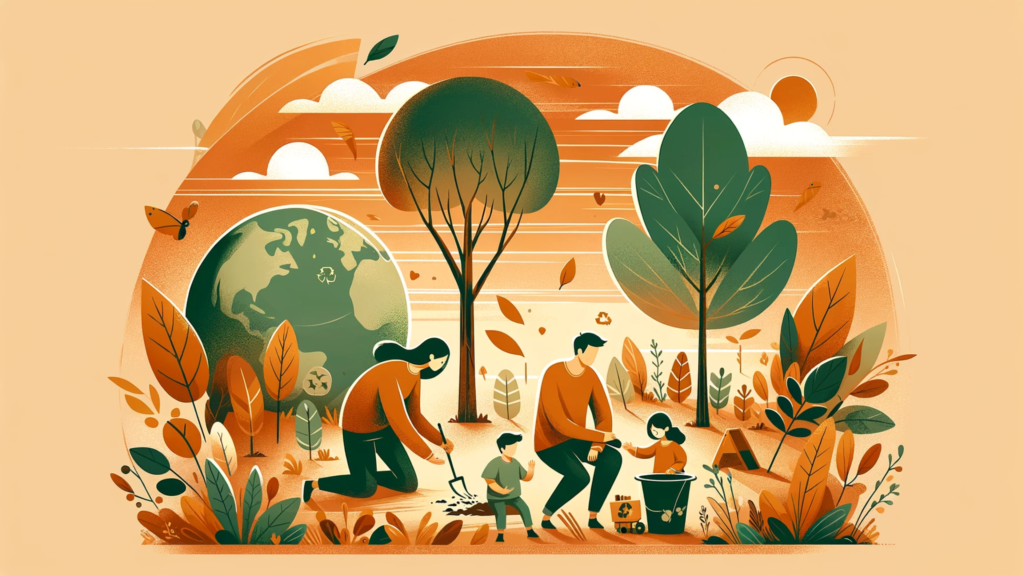In today’s increasingly digital world, it’s easy for children to become disconnected from nature. With the lure of screens and indoor activities, many preschoolers are spending less time outdoors. However, the importance of nature and outdoor play in preschooler development cannot be overstated. These experiences offer a wide range of benefits that contribute to a child’s physical, cognitive, emotional, and social growth. In this article, we will explore the vital role that nature and outdoor play play in shaping the development of preschoolers.
Physical Development
One of the most evident advantages of outdoor play for preschoolers is the promotion of physical development. When children engage in outdoor activities, they have the opportunity to run, jump, climb, and explore their surroundings freely. These physical activities help in the development of their gross motor skills.

Running around on uneven terrain or climbing on playground equipment helps improve their balance and coordination. Preschoolers learn to judge distances, adjust their movements accordingly, and develop a better sense of spatial awareness. In addition, exposure to natural elements such as sunshine and fresh air contributes to overall well-being and helps strengthen their immune systems.
Cognitive Development
Outdoor play also has a significant impact on a preschooler’s cognitive development. Nature provides a rich and stimulating environment that encourages curiosity and exploration. When children explore the outdoors, they encounter various textures, shapes, colors, and sounds, which stimulate their senses and cognitive abilities.
Nature offers countless opportunities for learning. Preschoolers can observe insects, flowers, and animals, fostering an early interest in science and biology. They also develop problem-solving skills as they navigate the natural world, encounter obstacles, and make decisions about how to proceed. Outdoor play encourages creativity and imagination as children build forts, create games, and invent stories inspired by their surroundings.
Emotional Development
Spending time in nature and engaging in outdoor play has a positive impact on a child’s emotional development. Nature provides a calming and soothing environment, reducing stress and anxiety levels. Preschoolers often experience a sense of wonder and awe when they encounter the beauty of the natural world, helping them to connect with their emotions on a deeper level.

Outdoor play also promotes self-confidence and independence. Children learn to assess risks and make decisions about what activities they feel comfortable engaging in. They gain a sense of accomplishment as they overcome challenges and obstacles in the outdoor environment, boosting their self-esteem.
Social Development
Nature and outdoor play are not only valuable for individual development but also play a crucial role in fostering social skills in preschoolers. When children play outdoors, they often engage in group activities, sharing experiences and interacting with their peers. This social interaction helps them develop essential social skills such as cooperation, communication, and conflict resolution.
Nature also encourages empathy and a sense of responsibility towards the environment and living creatures. Preschoolers learn to appreciate the interconnectedness of all living things, which can lead to a greater sense of compassion and stewardship.
Environmental Awareness
Exposure to nature during preschool years can lay the foundation for a lifelong love and respect for the environment. Preschoolers who regularly spend time outdoors are more likely to develop an appreciation for the natural world and a sense of environmental responsibility.

Educators and parents can use outdoor experiences to teach preschoolers about the importance of conserving nature, reducing waste, and protecting wildlife. These early lessons can instill a sense of environmental awareness and inspire them to become future advocates for the planet.
Role of Adults In Preschooler Development With Outdoor Play
Adults play a crucial role in facilitating outdoor play and nature experiences for preschoolers. Parents, caregivers, and educators can encourage children to spend time outdoors by providing safe and stimulating environments.
Here are some tips for adults to support preschooler development through outdoor play:
- Create a nature-rich backyard or play area with opportunities for exploration, such as a sandbox, garden, or wildlife feeders.
- Plan regular outdoor outings to parks, nature reserves, and natural play spaces.
- Encourage unstructured play, allowing children to use their imagination and creativity.
- Provide age-appropriate tools and equipment for outdoor activities, such as buckets, shovels, and magnifying glasses.
- Model enthusiasm for nature and outdoor exploration to inspire children’s curiosity.
Conclusion
In a world where technology often competes for a child’s attention, it’s essential to recognize the enduring importance of nature and outdoor play in preschooler development. These experiences offer a myriad of benefits, ranging from physical and cognitive growth to emotional and social development. By prioritizing outdoor play and nature exposure in a child’s early years, we can lay the foundation for a healthier, more balanced, and environmentally conscious future generation. Preschoolers who spend time in nature are not only developing valuable life skills but also forming a deep connection to the natural world that will serve them well throughout their lives.
Start A New Chapter In Your Child’s Education
At Kids Learning Academy, we’re dedicated to fostering the holistic development of your child. Our carefully designed programs are crafted to ignite their curiosity, enhance their cognitive skills, and nurture their creativity. We believe in providing a safe and stimulating environment where children can thrive. Join us in this exciting journey of growth and learning. Enroll your child today to give them the best start in life!